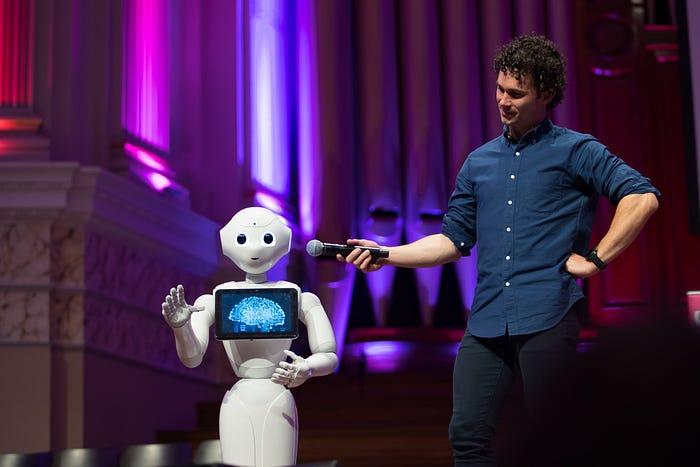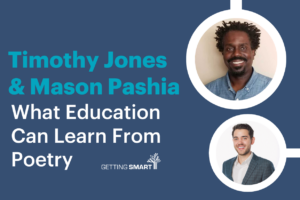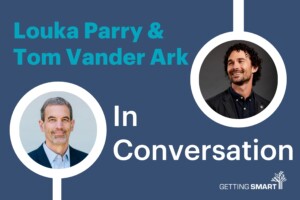Our Learning Future from A to Z
Key Points
-
Schools and organizations are human systems, filled with opportunities.
-
And yet there is a profound difference between building from a foundation of schooling and building from a foundation of learning.

By: Louka Parry
One can choose to go back toward safety or forward toward growth. Growth must be chosen again and again; fear must be overcome again and again.
-Abraham Maslow
Schools and organizations are human systems, filled with opportunities. And yet there is a profound difference between building from a foundation of schooling and building from a foundation of learning.
Rather than simply replicate and scale the arrangements of schooling, we must seize the possibility to shift from a schooling system to a learning ecosystem to truly empower learners, educators, and parents to create a virtuous future for themselves and their communities.
Clearly, we live in this moment of increasing complexity with generative AI (ChatGPT), geopolitical crises (Ukraine), financial instability (inflation), pandemics (Covid), and ecological precariousness (climate change, biodiversity loss) impacting all aspects of living in the modern world. With this as the backdrop, we get to move away from the rigidity of schooling models we’ve inherited (and unconsciously reinforce) and venture into the emerging learning paradigm.
Technology, if used well, might allow us to return to our deep humanity
The future will be what we make it and therefore certainty is an impossibility. But if I can be so bold, it’s clear our future will be one filled with life-long, life-deep, and life-wide learning that must unlock both human and planetary flourishing. This means leveraging exponential technologies to become more human and solve wicked problems as we create new possibilities. To cultivate first-class human beings, rather than second-class robots, as the saying goes.
As an education futurist and learning strategist, and CEO of The Learning Future, my days are filled with all kinds of wonderful conversations and work in, on, and about learning (plus all the other prepositions). I am lucky to attend a range of global fora relevant to this, including an Education Futures Fellowship at Salzburg Global Seminar last year and the UNGA, and reflecting on this I want to share a list of themes that I see are emerging and exciting me and other rather brilliant educators and innovators with whom I work and learn.
So below is an incomplete and constantly evolving list of key concepts for our collective Learning Future.
A-Zs that can unlock learning
This new alphabet (terribly English-centric), from A-Z, seeks to help learners, educators, leaders, and parents discover some of the key trends and themes that are taking hold. Our challenge will be how we choose to redesign and remake our experiences, environments, and ecosystems so that we unlock our true creative potential and thrive in the future.
Agency — The feeling of conscious control over our actions and their consequences. Last year, we released a podcast with the brilliant Charlie Leadbeater and a network of Australian schools that unpacks 10 lessons for placing agency at the heart of schools. [Listen]
Belonging — We have a need to belong and yet 1 in 5 people suffer from chronic loneliness*. Cultivating environments of belonging that create a social fabric is key to psychological safety and any optimal learning or work experience. (*Campaign to End Loneliness)
Creativity — A fundamentally human skill, to create something that wasn’t there before, great words from a mentor of mine Larry Rosenstock. In this creativity crisis, it’s essential we develop our unique creativity at all levels of education and work to best contribute to the economy and society.
Discernment — In a world awash with information, navigating misinformation and developing the ability to think critically is a key pillar of education. How do we decide what is right and challenge bias and mental models? We develop our capacity to challenge, question, take perspective and unearth bias.
Embodiment- We live our lives in our bodies and practices that help us connect the brain and body are the baseplace for optimal well-being through learning. Mind-body interrelationships are so clear as the extended mind research is now telling us.
Flourishing — The ultimate goal of education and all social progress. Collective flourishing — where we have social prosperity in planetary limits set by biocollective.
Generative AI Generative artificial intelligence describes algorithms (such as the now infamous ChatGPT) that can be used to create new content, including audio, code, images, text, simulations, and videos by giving it tasks in fairly usual language. It has huge ramifications for schooling, especially assessment, and also for the workforce. (McKinsey)
Humanistic psychology — (thanks Maslow!) As a whole person, we are greater than the sum of our parts.
Inquiry-based learning — A focus on investigation and problem-solving. Growing a learner’s capacity for curiosity, critical thinking, and creativity through real-life questions, problems, and scenarios to explore.
Joy — An under-appreciated emotion, it is more than happiness. Joy can co-exist with sadness and it is often a by-product of the core modality of play.
Kindness — “No act of kindness, no matter how small, is ever wasted.” (Aesop). Above all, be kind. Famous last words from Aldous Huxley. Schools and workplaces that cultivate kindness create psychological safety and more virtuous cultures that support optimal learning and growth.
Learning intentions — Provide clarity of the knowledge and understanding, to support student success and guide improvement strategies.
Meta-learning — Learning about learning, especially mental models. We become great learners only when we can rise about our learning and look at how we learn best, and what models we are using in our life to learn quicker. Great work from FS blog.
Neuroscience — Brain research highlights how complex structures and processes of the brain impact human functioning and behavior (affective and cognitive). See the excellent work of Mary Helen Immordino-Yang
OCEAN: Who are you? OCEAN is an acronym that seeks to deconstruct personality and increase self-awareness by considering your: Open-mindedness, Conscientiousness, Extraversion, Agreeableness, and Neuroticism. Great article here.
Pedagogical core: This refers to the content (the what?), the resources (with what?), and the teachers (with whom?). It is the core business of schools and when we focus on all these elements it offers many ways of innovating learning environments and transforming education (OECD, 2013).
Questioning: “My mother made me a scientist,” recalled physicist Isidor Rabi, Nobel Prize laureate. “Izzy,’ she would say, did you ask a good question today?” (Forbes, 2020)
Relationships: quality relationships are shown to be the strongest predictive factor for our health. And increasingly I consider all learning as understanding relationships, between concepts, emotions, memories, possibilities, and perspectives.
Self-determination theory: One of the most important ways of understanding how we can help ourselves and others live a purposeful life. (Deci & Ryan, 2000)
Trans-disciplinary learning — Making connections across subjects that allows for deeper learning and grows learner capacity to tackle complex global problems we face now and in the future.
Understanding — “Seek first to understand, then to be understood” (Covey, 1989). So much of our learning is not about knowledge, but about understanding, which is connecting knowledge
Vitality — Rather than thinking of just the outputs of school. Even the well-known PERMA framework added vitality after the fact.
Wellbeing — Evident in our sense of satisfaction, a connection to meaning and purpose. It is the sense of feeling well, linked to our thoughts, emotions, actions, and experiences. This is a core goal of modern learning organizations and systems, as the renewed global focus tells us.
X — The unknown variable. In our complex world, not all can be known, not all can be understood. Yet we must still make progress, and factor in the unknowns.
Yes (as a default) — So often we default to no in our schools and workplaces, or as leaders. If we start with yes it opens possibilities that can then be explored through ideation and prototyping.
Zest — remember that this is your life. Nothing is achieved without enthusiasm and ultimately we should all ask ourselves this key question of ourselves, our colleagues, and our students: what is yours to do today?
I’m aiming to create a short video of each of these terms across the rest of 2023. If you want to follow along, check out The Learning Future YouTube Channel and the podcast that we release.
Whatever learning you’re currently engaged in, I hope it brings you new discoveries, and new self-awareness and reminds you of the difference you make to the world around you.
Here’s to a full year of fully human learning.
This post was originally published here.
Louka Parry is the CEO and Founder of The Learning Future, an organisation that supports schools, systems and companies to thrive in tomorrow’s world. A former teacher, he became a school principal at 27 years old and was named Inspirational Public Secondary Teacher of the Year for South Australia.




0 Comments
Leave a Comment
Your email address will not be published. All fields are required.